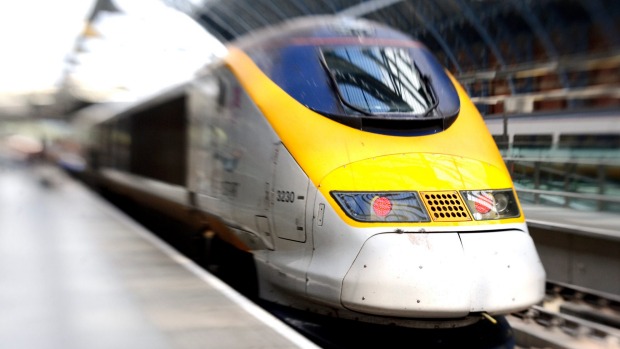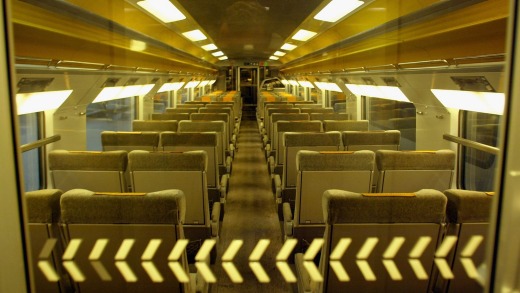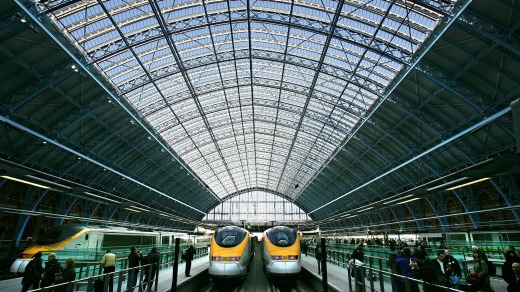
Perhaps one of Margaret Thatcher's most unexpected legacies was the Channel Tunnel, connecting Britain with France by rail. Not only did it seem to belie her Euroscepticism, she was also known to dislike the railways and only travelled on them a few times during her premiership. It's still a surprise to remember that it was under her leadership that the decisions to build the tunnel and to make it a rail-only connection were made.
The tunnel and in particular the Eurostar services that hurtle between London and Paris (and, ironically, Brussels, the headquarters of the European bureaucracy) were intended to bring about a change in our relationship with Europe. Perhaps, the dreamers thought, passengers standing at St Pancras International station (or Waterloo, Britain's international rail terminus until 2007) would one day be offered the same array of destinations as at Frankfurt, where there are trains to Paris and Prague, Milan and Copenhagen.

The first passenger train ran from Waterloo to Paris Gare du Nord 20 years ago this month, on November 14, 1994, and since then Eurostar has made travelling to the capitals of France and Belgium much more pleasant than before. Rail is a far more satisfying way to travel than making for one of London's airports and flying, with Paris just two-and-a-quarter hours away on the fastest trains and Brussels a mere two hours. Eurostar, which attracted more than 10 million passengers last year for the first time, has wiped out the competition from air on its two main routes, gaining more than two thirds of the market share. It offers a city centre-to-city centre trip that easily beats the plane in terms of time and comfort. Moreover, even though Eurostar has yet to get Wi-Fi on its trains, people are still able to work on their laptops and smartphones as the French countryside rolls by: a key advantage for rail.
The ride is smooth, the seats relatively comfortable and the staff - who are mainly French because of the difficulty of recruiting English people with sufficiently good French to work in the bilingual environment of the trains - unfailingly polite. There is, too, the pleasure of looking out the window to see the train far outpace even the Mercedes cars favoured by French business people on the adjoining autoroutes in France.
The service is also about to get better. New trains are on the way, controversially ordered from the German manufacturer Siemens rather than the French-owned Alstom. They will come into use next year and will be roomier and have more capacity - up to 950 seats, 200 more than the current carriages.

However, that promised radical transformation of European travel for British passengers has not come about. Unlike most 20-year-olds, Eurostar has changed little since its birth. Sure, the journey times have got quicker thanks to the opening of the high-speed link between London and the Channel Tunnel in 2007. But despite plenty of options for those connecting at Paris, Brussels and Lille, few new direct destinations have been added.
Disneyland Paris was introduced as a destination in 1996 as there is a TGV station nearby - and with fares priced as low as £69 ($100) return, it has become a destination for parents wanting to give their children the Mickey Mouse experience without the expense of a transatlantic flight. Since 1997, "snow trains" have run to Bourg St Maurice serving a number of ski resorts in the French Alps, including Courchevel and Val d'Isere. But thereafter only Avignon was added as a direct service - a summertime stop for British tourists heading for Provence.
There are several reasons for this limited expansion. First, there are not many destinations where running a daily or more frequent train with 750 seats is justified. Channel Tunnel rules mean that the 18-coach-long trains are not allowed to be split - and operating such lengthy trains is expensive and cannot be justified to minor destinations.
Second, European railways are heavily regulated. Under EU rules, operators pay access charges per kilometre for their trains to use the track, pushing up fares for longer journeys; there is an additional charge for going through the tunnel. Moreover, there is a limit to the length of time people are prepared to sit in trains rather than fly.
However, the biggest barrier has been red tape centred on security issues. The Channel Tunnel Act of 1987 requires train operators to screen baggage, while the Border Agency insists that trains are run from dedicated platforms sealed off from the rest of the station to prevent illegal immigrants climbing aboard. Initially it was assumed that some of these rules could be eased and that passport checks would eventually be made on board, but this has been vetoed. As a result it is simply not cost-effective to run from many destinations.
Nevertheless, the introduction of the 10 new train sets - costing upwards of £700 million - will mean Eurostar will become more proactive in developing new routes. The first sets are to be deployed on services to Lyon, Avignon and Marseille, which will run year round, starting from May 1, 2015. To meet security regulations, passengers returning to Britain will board as usual in France, then have to disembark at Lille with all their baggage, go through security and return to the train, a process that will add an hour - and plenty of hassle - to their journey. This may well deter business travellers from using the service and will also dent the leisure market.
Nicolas Petrovic, the boss of Eurostar, has lobbied hard to get the security services to relent but has failed. "It is not ideal but we would rather get the service going and establish it, and then work to make better arrangements," he says.
In late 2016, direct services to Rotterdam and Amsterdam are to be introduced using the new trains - without the disembarkation at Lille - to challenge what is one of the world's busiest air routes. Eurostar is also considering other destinations, such as Cologne and Frankfurt.
Eurostar has had a 100 per cent safety record during its 20 years of operation, with no accidents - although there have been some bad days. The tunnel itself had major fires in 1996 and 2008, caused by lorries - on trains not connected with Eurostar - and on both occasions sections had to be closed for several months, causing disruption to services. In December 2009 four trains broke down in the tunnel and numerous others were held up outside in blizzard conditions. (The breakdowns were caused by - literally - the wrong sort of snow; a large quantity of fine snow entered the power cars and was sucked through the ventilation system to the electronic control cabinets where it melted and caused a series of failures.) In all, 75,000 people had their trips delayed and the chaos at St Pancras attracted national headlines (although in comparison to the regular travails of passengers at Heathrow, the public relations effect soon blew over). In a way, that episode simply reflected the fact that Eurostar had become an essential part of Britain's infrastructure.
The service can be good value if you book in advance - the £69 return has stayed at that price for many years. However, travelling at peak time is normally more expensive than equivalent airline flights (though the way air fares are adjusted almost minute by minute to suit the market makes comparisons difficult). The basic fare with a "semi-flex" ticket in Standard is normally around £305 return to Paris.
Hopes that a range of operators might enter the market to rival Eurostar have not yet materialised. A couple of years ago Deutsche Bahn announced plans to offer competing services to Brussels and various destinations in Germany and one of its high-speed ICE trains was driven through the tunnel to St Pancras with much fanfare. However, it appears that DB has gone cold on the idea. There is as yet no date for the start of services.
With those first passenger trains back in 1994, Eurostar changed our perceptions of travel to the Continent. The new services it has planned will certainly refresh our ideas, even if they don't offer the step-change that many have hoped for. As for the future, travelling by train from Britain may never have the convenience of the cross-border hops available elsewhere in Europe, but as the gateway to a wider world, Eurostar still has the capacity to impress.
The Telegraph, London